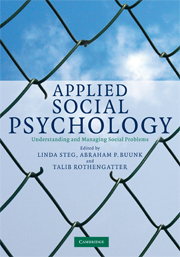Book contents
- Frontmatter
- Contents
- List of figures
- List of tables
- List of boxes
- List of contributors
- Acknowledgments
- 1 Introduction to applied social psychology
- 2 The USE of theory in applied social psychology
- 3 Applications of social psychology to increase the impact of behaviour-focused intervention
- 4 Research designs in applied social psychology
- 5 Social psychology and economic behaviour: heuristics and biases in decision making and judgement
- 6 Social psychology and immigration: relations between immigrants and host societies
- 7 Applying social psychology to the classroom
- 8 Social psychology and environmental problems
- 9 Gender issues in work and organizations
- 10 Social psychology of health and illness
- 11 Social psychology and mental health
- 12 Social psychology and modern organizations: balancing between innovativeness and comfort
- 13 Social psychology and the study of politics
- Index
- References
1 - Introduction to applied social psychology
- Frontmatter
- Contents
- List of figures
- List of tables
- List of boxes
- List of contributors
- Acknowledgments
- 1 Introduction to applied social psychology
- 2 The USE of theory in applied social psychology
- 3 Applications of social psychology to increase the impact of behaviour-focused intervention
- 4 Research designs in applied social psychology
- 5 Social psychology and economic behaviour: heuristics and biases in decision making and judgement
- 6 Social psychology and immigration: relations between immigrants and host societies
- 7 Applying social psychology to the classroom
- 8 Social psychology and environmental problems
- 9 Gender issues in work and organizations
- 10 Social psychology of health and illness
- 11 Social psychology and mental health
- 12 Social psychology and modern organizations: balancing between innovativeness and comfort
- 13 Social psychology and the study of politics
- Index
- References
Summary
Introduction: social problems and human cognition and behaviour
Social psychology is a basic science aimed at understanding human social behaviour and the motivations, cognitions and emotions related to such behaviour. For example, social psychologists try to understand why people so easily give into social pressure, why people often seem insensitive to the needs of others, why people become aggressive, why people like each other or why people are unhappy even though they seem to have everything going for them. Social psychology tries to build knowledge primarily through laboratory experiments, and therefore theories and findings from social psychology may sometimes seem remote from the actual problems in society. However, many, if not most, societal problems have social-psychological aspects, that is, they are rooted in behaviour or human cognitions. For example, integration problems may result from conflicts between groups and the inherent human tendency to favour one's own group, and traffic accidents are to a large extent caused by unsafe driving styles and the unrealistic perception that one is a better driver than most others. Moreover, health problems are related to unhealthy eating habits and a sense of not being able to control one's appetite, and environmental problems result in part from growing consumption levels and a tendency to pay attention only to one's immediate interests. Consequently, solutions and prevention of such problems require changes in attitudes, values, behaviour and lifestyles (Zimbardo, 2002). Social psychologists can play an important role in this respect.
- Type
- Chapter
- Information
- Applied Social PsychologyUnderstanding and Managing Social Problems, pp. 1 - 27Publisher: Cambridge University PressPrint publication year: 2008
References
- 1
- Cited by



